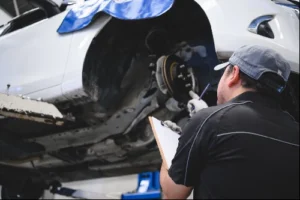When it comes to vehicle maintenance, knowing when to replace your car brakes is crucial for your safety and the longevity of your vehicle. This guide will help you understand the signs that indicate it’s time for a brake replacement and why timely brake maintenance is essential.
Quick reflexes are essential when you’re driving. Things pop up out of nowhere, people make their stops short, and sometimes our ability to think quickly is the only thing that will keep us safe. Unfortunately, quick reflexes won’t be as helpful if your brakes need a replacement. We don’t need to tell you how important your brakes are. They keep you, your family, and your vehicle safe.
You should have your brake pads replaced every 10,000 to 20,000 miles or sooner if you notice any trouble. Additionally, you need your brake fluid exchanged every four years at a minimum, and your rotors should be looked at every 50,000 miles.
However, you should always go with your gut. If you’ve only had a few thousand miles added since your last brake check, but things are feeling slightly off, it’s better to be safe than sorry.
Why Are Car Brakes Important?
Car brakes are one of the most critical components of your vehicle’s safety system. They allow you to stop your car promptly, avoiding potential accidents. Properly functioning brakes ensure your vehicle’s performance and safety, giving you confidence on the road.
How Do Car Brakes Work?
Before diving into the signs of brake wear, it’s essential to understand how car brakes work. Most modern vehicles use a disc brake system, which consists of:
a. Brake Pads
These pads press against the brake rotor to create friction and slow down the vehicle.
b. Brake Rotors
These are metal discs attached to your wheels that the brake pads clamp down on.
c. Brake Calipers
These hold the brake pads and use hydraulic pressure to squeeze them against the rotors.
d. Brake Fluid
This fluid transfers the force from your brake pedal to the brake pads.
When you press the brake pedal, the brake fluid activates the brake calipers, which push the brake pads against the rotors, slowing down your car through friction.
Signs That It’s Time to Replace Your Car Brakes
- Squeaking or Squealing Noises
One of the first signs of brake wear is a high-pitched squeaking or squealing noise. This sound often indicates that your brake pads are worn and need to be replaced. Most brake pads have a built-in wear indicator that produces this noise to alert you when it’s time for new pads. - Grinding Sounds
If you hear a grinding noise when you brake, it usually means that your brake pads are completely worn out and the metal parts of the brake system are rubbing against each other. This can damage your rotors and calipers, leading to more costly repairs if not addressed immediately. - Vibration or Pulsation in the Brake Pedal
A vibrating or pulsating brake pedal is often a sign that your brake rotors are warped. Warped rotors can occur from excessive heat or wear. If you notice this issue, it’s crucial to have your brakes inspected and possibly replace the rotors. - Longer Stopping Distances
If your car takes longer to stop than it used to, this is a clear sign that your brakes are not functioning properly. Worn brake pads or low brake fluid levels can increase your stopping distance, which can be dangerous in emergency situations. - Brake Warning Light
Modern vehicles are equipped with dashboard warning lights for various systems, including the brakes. If the brake warning light on your dashboard comes on, it’s a sign that there’s a problem with your braking system that needs to be checked by a professional. - Pulling to One Side When Braking
If your car pulls to one side when you brake, it could indicate uneven wear on your brake pads or a problem with the brake fluid. This issue can affect your vehicle’s stability and should be addressed promptly. - Soft or Spongy Brake Pedal
A soft or spongy brake pedal is often a sign of air in the brake lines or a leak in the brake system. If you experience this, you should have your brakes inspected immediately as it can significantly affect your braking ability.
When to Replace Your Car Brakes?
The frequency of brake replacement depends on several factors, including your driving habits, the type of brake pads used, and the conditions in which you drive. However, a general rule of thumb is to inspect your brakes every 10,000 to 20,000 miles and replace the brake pads every 40,000 to 50,000 miles.
Factors Affecting Brake Wear
- Driving Habits
Aggressive driving, such as frequent hard braking, can wear out your brakes faster. - Type of Brake Pads
Different brake pads have different lifespans. For example, ceramic pads last longer than semi-metallic ones but are also more expensive. - Driving Conditions
Driving in stop-and-go traffic or in hilly areas can cause your brakes to wear out faster than driving on highways or flat terrain.
The Importance of Regular Brake Inspections
Regular brake inspections are crucial to ensure your brakes are in good working condition. During a brake inspection, a professional mechanic will check the thickness of your brake pads, the condition of the rotors, and the brake fluid levels. This can help identify potential issues before they become major problems.
How to Maintain Your Brakes
Maintaining your brakes can extend their lifespan and improve your vehicle’s safety. Here are some tips for brake maintenance:
- Check Brake Fluid Levels
Ensure your brake fluid is at the correct level and replace it according to your vehicle’s maintenance schedule. - Avoid Heavy Braking
Try to avoid sudden stops and hard braking, which can wear out your brakes faster. - Use Engine Braking
When driving downhill, use engine braking to reduce the load on your brakes. - Have Regular Brake Inspections
Regularly have your brakes inspected by a professional to catch any potential issues early.
Reliable Car Brake Maintenance in Placentia, CA

break inspection for vehicle maintenance checklist
If you notice any brake wear signs or if your brake warning light comes on, it’s essential to seek professional help immediately. A qualified mechanic can inspect your brakes, diagnose the problem, and recommend the necessary repairs or replacements.
Knowing when to replace your car brakes is essential for your safety and your vehicle’s performance. Regular brake inspections, proper maintenance, and being aware of the signs of brake wear can help you avoid potential accidents and costly repairs. Remember, your brakes are your car’s most critical safety feature, and taking care of them should be a top priority.
By understanding the importance of brake maintenance and recognizing the signs that it’s time to replace your car brakes, you can keep your vehicle in top shape and ensure a safe driving experience for you and your passengers.
We can help! Yorba Linda can help you check your brakes and replace them so your vehicle can get back on the road safely. If you have further questions or are interested in our services, please visit us at 801 S Lakeview Avenue, Unit G, Placentia, CA 92870, or call us at (714) 970-4190 to schedule an appointment today! Don’t forget to visit us on our Facebook page!
Read related blogs: Top 5 Essential Brake Maintenance Tips for a Smooth and Safe Ride












[…] Keep a small trash bag in your vehicle to prevent clutter buildup. Empty it regularly to maintain a clean…